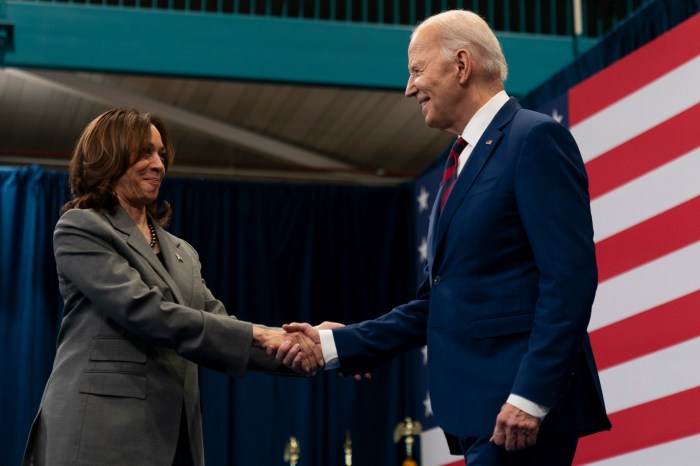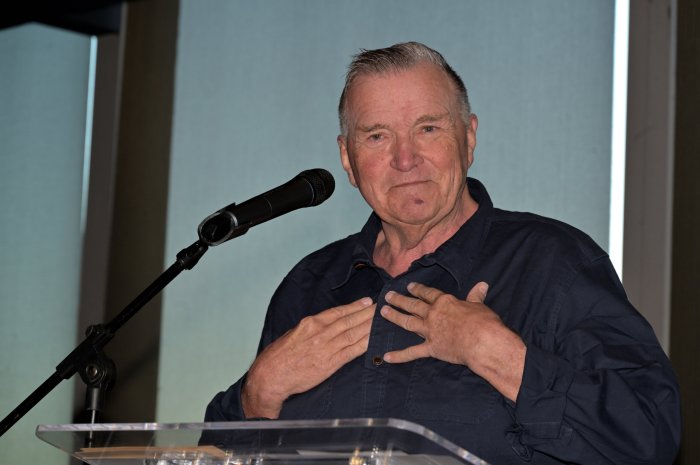With less than a month to go before the Democratic primary, Trevor Thomas works the phones in his Grand Rapids campaign office. | TREVORFORCONGRESS.COM
“I believe it’s time for us to return to the values of Jerry Ford, who put party aside to do what was best for our country.”
That is certainly an unusual opening salvo in the congressional campaign of a first-time Democratic candidate who is only 28 years old.
The sound bite may seem even more surprising coming from a gay man who, during nearly four years in Washington, worked in the press shop at the Human Rights Campaign and as communications director for the Servicemembers Legal Defense Network (SLDN), the lead advocacy group in the successful fight to repeal Don’t Ask, Don’t Tell.
But back in February, Trevor Thomas was already looking forward to a fall challenge against Justin Amash, a 32-year-old freshman Republican congressman who won election in 2010 as a Tea Party darling in the Third Congressional District of Michigan, centered on Grand Rapids. That was the city the late former president represented in Congress for nearly a quarter-century prior to his appointment as vice president in 1973. Amash, in Thomas’ estimation, is a prime example of the Republican Party’s retreat from moderation in the 35 years since Ford left the presidency.
The son of a Palestinian Christian immigrant father who succeeded as an entrepreneur after arriving in Michigan as a youth in the 1950s, Amash served a single term in the Michigan House of Representatives before running for the open Third District House seat, winning a five-way GOP primary with just 40 percent of the vote, but going on to trounce his Democratic opponent by more than 22 percent. He had the support of Tea Party leaders, FreedomWorks PAC, founded by industrialist David Koch and chaired by former GOP House Majority Leader Dick Armey, and the Club for Growth, an anti-tax lobby that puts enormous rightward pressure on the Republican Party.
Amash, who was endorsed in 2010 by Congressman Ron Paul and in turned supported the Texan’s presidential run this year, was one of only a few Republicans to vote against the Defense Department authorization bill, and he opposes the GOP budget developed by Wisconsin’s Paul Ryan, saying it does not go far enough in making spending cuts. He has also been a critic of the auto industry bailout and describes himself as Congress’ most pro-life member.
It is those last two positions, in particular, that make the incumbent vulnerable, Thomas believes. Thomas’ parents were members of the United Auto Workers (UAW) for 34 years while employed at a General Motors plant in Wyoming, just outside Grand Rapids, and while the auto plants themselves are gone from the Third District –– all the way across the state from Detroit –– auto-related industries remain important throughout southern Michigan. Saving Detroit forestalled an even graver economic crisis than the state is already enduring.
And with “the war on women” tag being hung around the necks of Republicans across the nation, Thomas also believes the Third District is ready to elect a pro-choice candidate. Redistricting since the 2010 Census has added Battle Creek to the Michigan Third, tilting it slightly more Democratic. Still, the Cook Political Report scores the district as +6 Republican, meaning that in recent elections the GOP has outperformed its national showing by six percentage points there. Cook rates the November contest as a “likely Republican” win.
Whatever the prospects for the fall, however, November is still a long four months away, and Thomas must first prevail in the August 7 Democratic primary against Steve Pestka, a 60-year-old attorney who served four years in the State House of Representatives and six years on the Kent County Circuit Court bench after his appointment by then-Governor Jennifer Granholm. Many local Democratic elected officials –– in fact much of the state party establishment –– have rallied around Pestka, who also won the endorsement of the UAW, much to Thomas’ consternation, given his parents’ long dues-paying affiliation with the union.
“We asked for neutrality,” Thomas recalled in an interview earlier this year with Gay City News. “I had neutrality. Then, 72 hours later, they didn’t have the heart to call me.”
Thomas explained that the UAW move was just part of a closing of ranks around a longtime party figure after polling showed that Amash could be vulnerable in the fall. Pestka, Thomas said, had actually encouraged him to run before that polling data emerged and Pestka himself jumped into the race.
Thomas has an even bigger hurdle than the establishment’s embrace of his opponent –– money. As of June 30, he had roughly $145,000 on hand for the August 7 primary; Pestka had nearly $660,000. Pestka’s enormous advantage, however, masks one factor that may work in Thomas’ favor –– intensity of support. Every dollar of the more than $260,000 Thomas has raised came from individual donors. Individual contributions to Pestka, on the other hand, totaled less than $170,000. An additional $35,000 came from political action committees, and a whopping $590,000 arrived in the form of contributions and loans from the candidate himself.
Besting an opponent with a 4.5 to 1 cash advantage is decidedly a long shot venture, but the committed support of a large donor base is also important, particularly in a party primary stuck smack dab in the middle of the summer’s dog days. The most recent financial filings by the candidates also suggest that Thomas may be able to narrow the gap somewhat in the primary campaign’s final five weeks. In the quarter ended June 30, Thomas raised $160,000 in individual donations; Pestka, only $53,000.
Thomas is running to Pestka’s left, faulting him largely in two areas –– the former state representative’s opposition to choice and his personal investment in a company acquiring land for fracking. Thomas has repeatedly brought up votes Pestka took in the State Legislature to defund Planned Parenthood, tying that position to a statement he made to the Grand Rapids Press in 2002 that “I could easily run as a Republican.” Planned Parenthood funds no abortion services in Western Michigan, Thomas said, so the impact of curtailing its funding would be felt in the areas of family planning and STD and HIV services.
Pestka’s supporters have responded that the Planned Parenthood votes were cherry-picked by Thomas, but the attack is apparently having traction. Pestka formerly voted pro-life; in fact, in 2002, he told the Grand Rapids newspaper he supports abortion only when the life of a pregnant woman is in danger. This year, he has stated on numerous occasions that while he remains personally opposed to abortion, he would not impose his own values regarding the issue on public policy questions facing Washington.
That said, Thomas is widely seen as the pro-choice candidate in the race by voters on both sides of the issue. Explaining that his sexuality and gay rights activism have not been a negative with voters he’s met, Thomas told Gay City News that the biggest flak he’s gotten in the campaign was for his position on choice at a Kent County Democratic Committee meeting.
Pestka has volleyed back against Thomas on a different progressive litmus test –– Social Security. On his campaign website, Thomas endorsed the idea of raising the Social Security eligibility age for Americans currently under 40. His opponent seized on that in a television ad to warn that seniors will be forced to wait on the benefits they had worked their adult lives expecting. A letter from the Thomas campaign to broadcast outlets running the ad charged that the Pestka campaign’s claim was defamatory under Michigan law and demanded it be removed from the air.
Pestka has also taken on his opponent over the Thomas campaign’s June release of a poll –– carried out by the Mellman Group, active nationwide largely on behalf of Democratic candidates –– that showed Thomas with a lead of more than 20 percent when respondents were read descriptions of the two contenders. In contrast, without any prompting, those surveyed gave Pestka a 21-16 percent lead, with 64 percent undecided. Pestka’s supporters argue that any poll commissioned by Thomas that “educates” voters on the candidates before asking their views is inherently skewed.
Still, the descriptions of the candidates could both easily apply generically to any Democrat, except for the final two sentences of each. One reads, “Thomas’ opponents say he is out of touch with this area’s values. Thomas, who supports abortion, spent much of his career working for the gay rights lobby.” The other read, “Pestka’s opponents say he wants to make abortion illegal even in cases of rape and incest, and Pestka admits that he could, quote, ‘easily be a Republican.’ Unquote.” It’s not clear that those characterizations unfairly boosted Thomas’ numbers.
The more likely problem with the polling results is that implicit in the methodology is the assumption that both candidates enjoy the same opportunity to get their message in front of voters, which is currently not the case. In fact, Thomas’ campaign used the results, in part, as a fundraising tool that emphasized the need for the resources to make voters aware of his candidacy.
Even if Pestka is the Democratic establishment’s favorite, Thomas is not without influential friends in Michigan politics. He has been endorsed by former two-term Governor Jennifer Granholm, a prominent progressive voice in national party politics, and her lieutenant governor, John Cherry. Prior to his time in Washington, Thomas worked in Granholm’s 2006 reelection campaign and later her administration, as well as in television news in Grand Rapids.
Thomas’ work at SLDN has won him endorsements from leaders in the Don’t Ask, Don’t Tell repeal effort, including its House sponsor, former Pennsylvania Congressman Patrick Murphy, and retired Lieutenant Colonel Victor Fehrenbach, an Air Force veteran who served in Iraq, Afghanistan, and Yugoslavia and successfully fought a discharge effort that began in 2008. Noting that Michigan’s Third District is among the top ten or 11 in the nation in the number of veterans but last in government benefits provided, Thomas said he often talks about his work on Don’t Ask, Don’t Tell repeal at campaign appearances.
Pestka’s endorsement by Armed Services Committee Chair Carl Levin, Michigan’s senior senator who played a key role in ending DADT, was a disappointment for Thomas, though he said it resulted from a longstanding friendship between Levin and his opponent’s father.
Thomas has the support of the National Stonewall Democrats, but he has not been endorsed by the Gay and Lesbian Victory Fund, which works to elect openly LGBT officials. The group has only given its nod to five non-incumbent House candidates, including New York’s Sean Patrick Maloney, who is seeking a Hudson Valley seat north of the city.
In addition to opposition from establishment Democrats, Thomas also faces some critics in progressive quarters. Describing his campaign as “destructive politics,” a Daily Kos blogger has written a series of harsh assessments of Thomas.
“The sad thing about Thomas' campaign is that this could and should have been a positive race focused on ensuring Democrats have the strongest candidate possible to take out far-right extremist Justin Amash in November,” the blogger, a Michigander identified as msuryanj wrote. “Instead, Mr. Thomas is only guaranteeing that this primary becomes costly in more ways than one for the Democrats.”
msuryanj also argued, “Pestka has the backing of nearly every female progressive that's endorsed in the race,” mentioning State Senate Democratic Leader Gretchen Whitmer, State House Democratic floor leader Kate Segal, and Wayne State University law professor Jocelyn Benson. The blogger failed, however, to note Granholm’s support for Thomas.


































